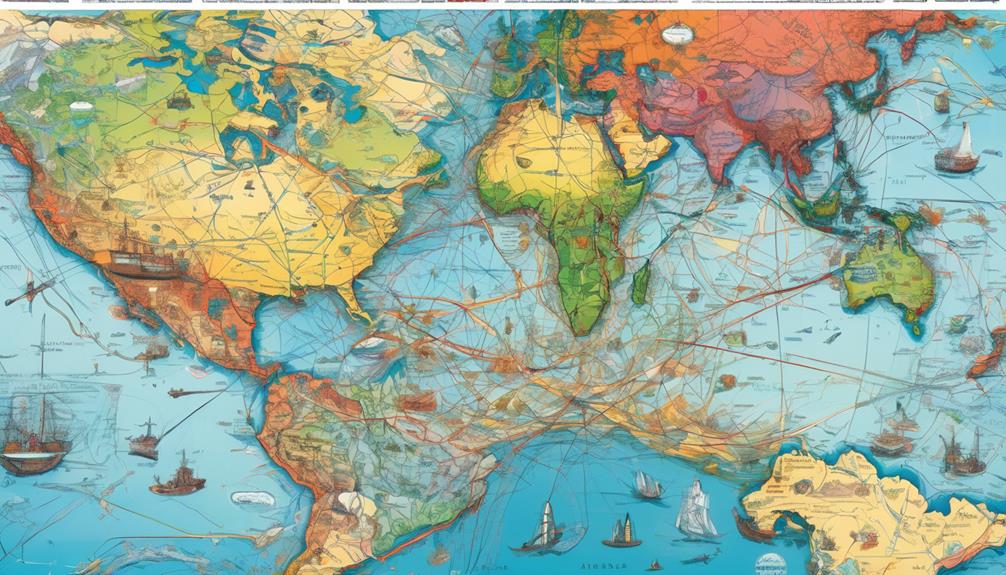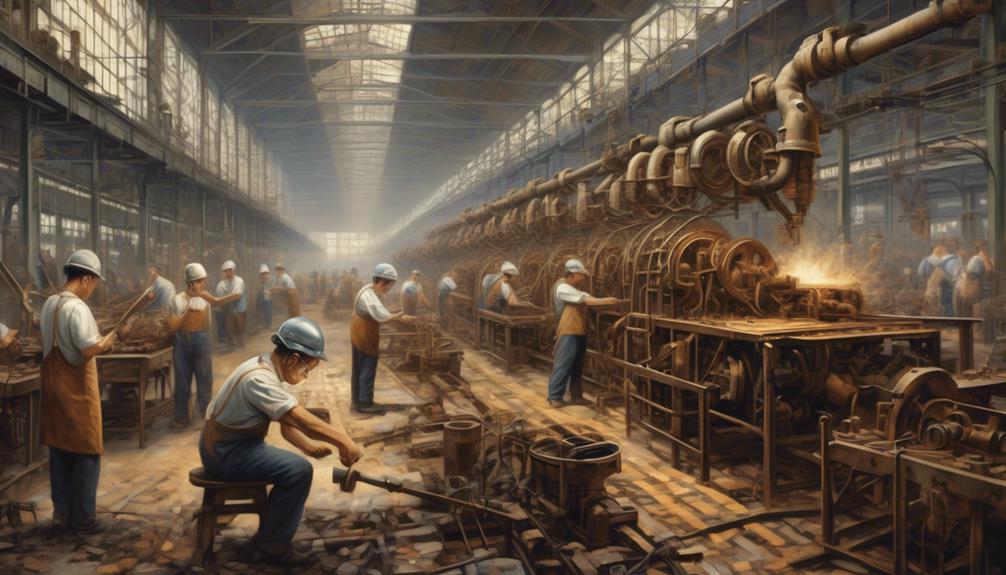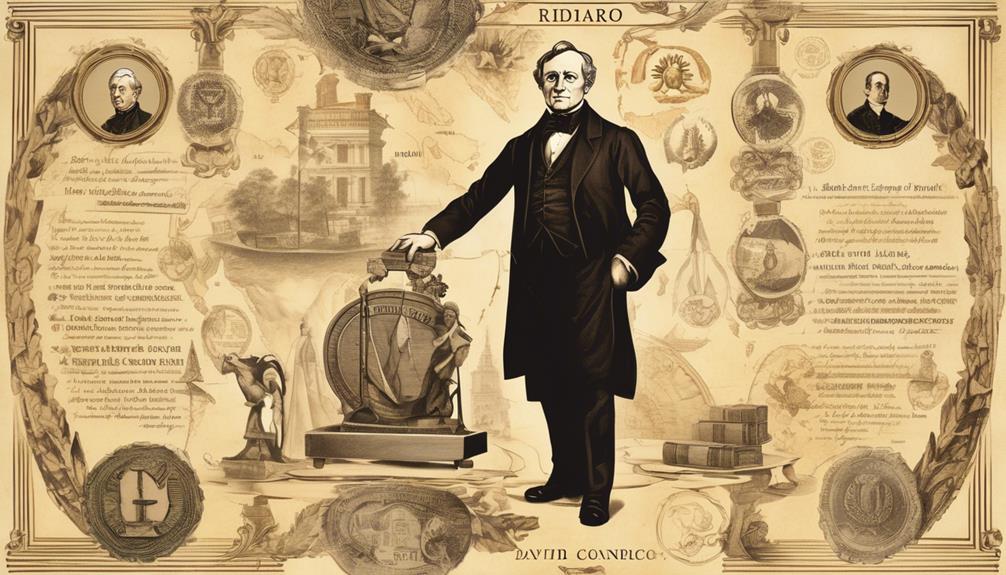As we explore the insights of David Ricardo, the celebrated economist from Britain, we discover a wealth of enlightening quotations. His concepts have significantly influenced the discipline of economics and remain pertinent in the current era of globalization.
One of his notable contributions is the concept of comparative advantage, which highlights the benefits of specialization and trade between nations. Through his extensive research and analysis, Ricardo emphasized the importance of economic policies that promote free trade and minimize government intervention.
His labor theory of value and observations on the impact of taxation further enriched our understanding of economic incentives.
Join us as we explore the profound insights of David Ricardo and uncover the enduring legacy he left behind.
Key Takeaways
- David Ricardo's concept of comparative advantage and trade is a fundamental principle in economics that explains the benefits of specialization and trade.
- The importance of specialization and division of labor, as highlighted by Ricardo, allows individuals and businesses to become experts, increases productivity and output, and promotes innovation and technological advancements.
- The labor theory of value, although criticized for not accounting for scarcity, utility, and demand, emphasizes that the value of a commodity is determined by the labor required for its production.
- The impact of taxation on economic incentives is significant, with higher taxes on the wealthy potentially reducing work and investment incentives, while carefully designed tax incentives can influence behavior change.
The Concept of Comparative Advantage
The concept of comparative advantage, first developed by David Ricardo, is a fundamental principle in economics that explains the benefits of specialization and trade between individuals, firms, and nations.
Comparative advantage in international trade refers to the ability of a country to produce a particular good or service at a lower opportunity cost than other countries. This means that even if a country isn't the most efficient producer of a certain good, it can still benefit from trading with other countries that have a higher efficiency in producing that good.
The theory of absolute advantage in economics, on the other hand, suggests that a country should specialize in producing goods in which it has an absolute advantage, meaning it can produce more of a good with the same amount of resources compared to another country.
However, the concept of comparative advantage argues that even if a country has an absolute disadvantage in producing all goods, it can still benefit from trade by focusing on producing goods with a lower opportunity cost.
The Role of Trade in Economic Growth

Trade plays a crucial role in economic growth and prosperity. By engaging in trade, countries can specialize in the production of goods and services in which they have a comparative advantage, leading to increased efficiency and productivity.
This allows for the allocation of resources to their most efficient uses, contributing to economic development and the overall well-being of nations.
The economic benefits of trade include increased consumer choices, lower prices, job creation, and access to new markets and technologies.
Trade and Prosperity
Regular engagement in international trade plays a significant role in fostering economic growth and prosperity. Trade policies and the development of global supply chains are key factors that contribute to the positive impact of trade on an economy. By opening up markets and facilitating the exchange of goods and services, countries can benefit from increased productivity, innovation, and specialization. Trade allows nations to capitalize on their comparative advantages, leading to higher efficiency and competitiveness. Moreover, the integration of economies through trade promotes economic interdependence, which can help stabilize markets and mitigate the impact of shocks. A well-designed trade policy framework that promotes free and fair trade is crucial for maximizing the benefits of international trade and ensuring sustained economic growth and prosperity.
| Trade Policies | Global Supply Chains | Economic Growth |
|---|---|---|
| Facilitate trade | Enhance efficiency | Drive productivity |
| Promote open markets | Foster innovation | Encourage specialization |
| Ensure fair competition | Promote economic interdependence | Mitigate market shocks |
Economic Benefits of Trade
Engaging in international trade plays a pivotal role in driving economic growth and fostering prosperity. Trade allows countries to specialize in the production of goods and services in which they have a comparative advantage, leading to increased productivity and efficiency.
By participating in trade, nations can access a wider market for their products, leading to increased sales, profits, and employment opportunities. Additionally, trade promotes innovation and technological advancements as firms strive to stay competitive in the global market.
However, it is important to address the issue of economic inequality that can arise from trade. Trade barriers such as tariffs and quotas can hinder the benefits of trade, leading to limited access and higher prices for imported goods.
Therefore, it is crucial for countries to strike a balance between promoting trade and implementing policies that address economic inequality and protect vulnerable industries.
The Importance of Specialization
When it comes to economic efficiency, specialization plays a crucial role. By focusing on specific tasks or industries, individuals and businesses can become experts in their field, leading to increased productivity and output.
This specialization also allows for the benefits of division of labor, where different individuals or groups can specialize in different aspects of production, leading to further efficiency gains.
Economic Efficiency Through Specialization
Specialization plays a pivotal role in achieving economic efficiency by allowing individuals and organizations to focus their resources and skills on specific tasks or industries. This leads to significant productivity gains and overall improvement in the efficiency of the economy.
Here are some key reasons why specialization is important:
- Increased productivity: By specializing in a particular area, individuals can develop expertise and skills that lead to higher productivity levels. This allows them to produce more output in less time, resulting in greater economic efficiency.
- Resource allocation: Specialization enables the efficient allocation of resources. When individuals and organizations specialize, they can direct their resources towards the areas where they have a comparative advantage, maximizing their efficiency and output.
- Economies of scale: Specialization allows for the production of goods and services on a larger scale, leading to economies of scale. This reduces costs and increases efficiency, as fixed costs can be spread over a larger output.
- Innovation and technological advancement: Specialization fosters innovation and technological advancements. When individuals focus on specific tasks or industries, they are more likely to develop new ideas and technologies, leading to further productivity gains and economic growth.
Benefits of Division of Labor
The division of labor brings about numerous benefits and plays a crucial role in enhancing economic efficiency through specialization. By dividing tasks into smaller, more specialized units, individuals are able to focus on their specific area of expertise, leading to increased productivity and overall efficiency. This allows workers to become highly skilled in their respective tasks, resulting in higher quality output and faster completion times. Additionally, the division of labor promotes innovation and the development of new techniques or technologies, as workers constantly seek ways to improve their specialized processes. The table below highlights some of the advantages and productivity gains associated with the division of labor:
| Advantages | Productivity Gains |
|---|---|
| Efficient resource allocation | Increased output per worker |
| Time savings | Enhanced production speed |
| Improved quality control | Reduced training needs |
| Encourages innovation | Higher profitability |
The Labor Theory of Value

The Labor Theory of Value, as articulated by David Ricardo, posits that the value of a commodity is determined by the amount of labor required for its production. This theory challenges the traditional understanding of value, which suggests that value is determined solely by the subjective preferences of individuals. According to Ricardo, the labor theory of value provides a more objective and scientific explanation for the determination of value.
To further understand the labor theory of value, it's important to consider the following:
- Labor as the source of value: Ricardo argues that the value of a commodity is derived from the labor expended in its production. This means that the more labor-intensive a commodity is, the more valuable it becomes.
- Socially necessary labor time: The labor theory of value also takes into account the concept of socially necessary labor time. This refers to the average amount of time it takes to produce a particular commodity under normal conditions. The value of a commodity is thus determined by the socially necessary labor time required for its production.
- Exchange value: According to Ricardo, the labor theory of value helps explain the exchange value of commodities. The exchange value of a commodity is determined by the amount of labor that can be exchanged for it in the market.
- Criticisms and limitations: While the labor theory of value provides a valuable framework for understanding the determination of value, it has also faced criticisms. Some argue that it fails to account for other factors such as scarcity, utility, and demand, which also influence the value of a commodity.
The Impact of Taxation on Economic Incentives

Building upon Ricardo's labor theory of value, it's crucial to examine the impact of taxation on economic incentives. Taxation plays a significant role in income redistribution, as it allows the government to collect funds from individuals and businesses to finance public goods and services. However, it's important to consider how taxation affects economic behavior and incentives.
Taxation and income redistribution go hand in hand. By taxing individuals with higher incomes at a higher rate, governments can redistribute wealth and reduce income inequality. This can have both positive and negative effects on economic incentives. On one hand, higher taxes on the wealthy may reduce their incentive to work and invest, as they aren't able to keep as much of their earnings. On the other hand, progressive taxation can provide a safety net and promote social cohesion, which may encourage individuals to work harder and contribute to the economy.
Tax incentives can also play a role in behavior change. Governments often use tax breaks or deductions to encourage certain behaviors, such as investing in renewable energy or purchasing electric vehicles. These incentives can influence individuals and businesses to make decisions that align with the government's goals. However, it's important to carefully design tax incentives to ensure they're effective and don't create unintended consequences.
The Benefits of Free Trade

Free trade offers numerous economic advantages, promoting efficiency, innovation, and global collaboration. It's a system that allows countries to trade goods and services without restrictions or barriers such as tariffs or quotas. The benefits of free trade are far-reaching and can have a profound impact on both developed and developing nations. Here are some key advantages:
- Increased competition: Free trade encourages competition among businesses, which leads to lower prices for consumers and greater product variety. This competition also drives innovation, as companies strive to develop new and improved products to stay ahead in the market.
- Economic growth: By opening up markets and allowing for the free flow of goods and services, free trade stimulates economic growth. It provides opportunities for businesses to expand their customer base and reach new markets, leading to increased production and job creation.
- Lower prices: Free trade allows countries to specialize in producing goods and services where they've a comparative advantage. This specialization leads to increased efficiency and lower production costs, resulting in lower prices for consumers.
- Global collaboration: Free trade promotes cooperation and collaboration between countries. It encourages countries to work together, share knowledge, and learn from each other's experiences. This collaboration can lead to the transfer of technology, skills, and expertise, benefiting all participating nations.
The Role of Government in Economic Policy

Government plays a crucial role in shaping and implementing economic policies that have a direct impact on the overall well-being of a nation's economy. In order to ensure a stable and thriving economic environment, government intervention and economic regulation are necessary.
Government intervention refers to the actions taken by the government to influence economic activities and outcomes. This can include policies such as taxation, subsidies, and welfare programs. Economic regulation, on the other hand, involves the establishment and enforcement of rules and regulations to govern the conduct of businesses and industries. This is done to promote fair competition, protect consumers, and maintain market stability.
Government intervention is essential to address market failures and ensure the efficient allocation of resources. For instance, the government may intervene to correct externalities, such as pollution, by imposing taxes or regulations on polluting industries. Additionally, government intervention can help stabilize the economy during times of recession or financial crisis through monetary and fiscal policies.
Economic regulation is crucial to prevent monopolistic practices, ensure consumer protection, and maintain market integrity. By establishing rules and regulations, the government can promote competition, prevent unfair business practices, and safeguard the interests of consumers. This can include measures such as antitrust laws, consumer protection regulations, and industry-specific regulations.
The Legacy of David Ricardo

With a firm understanding of the role of government in economic policy, it's now imperative to explore the lasting impact of David Ricardo on the field of economics. Ricardo's theories and ideas continue to shape modern economics and have left a significant legacy. Here are some key aspects of Ricardo's legacy:
- The impact of industrialization on economic development: Ricardo recognized the transformative power of industrialization and its role in driving economic growth. His analysis of the relationship between industrialization and economic development laid the foundation for understanding the benefits and challenges of this process. His insights continue to be relevant in the study of economic development today.
- The influence of Ricardo's theories on modern economics: Ricardo's most notable contribution was his theory of comparative advantage, which revolutionized international trade. His idea that countries should specialize in producing goods in which they have a comparative advantage has had a profound impact on global trade policies. This theory continues to be widely taught and applied in economics today.
- Ricardo's emphasis on free trade and the benefits of specialization has had a lasting influence on economic thought. His work challenged protectionist policies and promoted the idea that open markets and competition lead to greater efficiency and prosperity.
- Ricardo's theories also laid the groundwork for the modern understanding of income distribution and the role of wages. His concept of the labor theory of value, although disputed by some economists, remains an important part of economic analysis.
The legacy of David Ricardo is evident in the way we understand and approach economic development, international trade, market competition, and income distribution. His ideas have shaped the field of economics and continue to be studied and debated by scholars and policymakers alike.
Frequently Asked Questions
How Did David Ricardo's Concept of Comparative Advantage Revolutionize International Trade?
The concept of comparative advantage, developed by David Ricardo, revolutionized international trade. Before Ricardo, the prevailing theory was the concept of absolute advantage, which focused on a country's ability to produce goods more efficiently than others.
However, Ricardo argued that even if a country had an absolute advantage in producing all goods, it could still benefit from trade if it specialized in producing goods with a comparative advantage. This theory highlighted the importance of specialization and opened up possibilities for mutually beneficial trade relationships between countries.
What Are the Key Factors That Contribute to Economic Growth Through Trade, According to David Ricardo?
Factors that contribute to economic growth through trade, according to David Ricardo, include specialization, comparative advantage, and the free movement of goods and services across borders.
Specialization allows countries to focus on producing goods or services in which they have a comparative advantage, leading to increased productivity and efficiency. This, in turn, promotes economic growth.
Additionally, the free movement of goods and services facilitates trade and fosters competition, which can lead to innovation and further economic expansion.
How Does Ricardo's Theory of Specialization Play a Crucial Role in Enhancing Productivity and Efficiency?
Specialization plays a crucial role in enhancing productivity and efficiency. By focusing on producing goods or providing services in which a country has a comparative advantage, resources can be allocated efficiently, leading to increased productivity.
This allows countries to specialize in what they do best and trade with other nations, maximizing overall output and economic growth. Ricardo's theory of specialization highlights the importance of comparative advantage in international trade and its positive impact on productivity.
Can You Explain David Ricardo's Labor Theory of Value and Its Significance in Economic Analysis?
In analyzing David Ricardo's labor theory of value and its significance in economic analysis, we find that Ricardo's theory provides a comprehensive framework for understanding how the value of goods and services is determined.
By emphasizing the role of labor in creating value, Ricardo highlights the importance of productivity and efficiency in economic systems.
This theory allows economists to assess the impact of labor on prices, wages, and overall economic growth, providing valuable insights into the dynamics of market forces.
How Does Taxation Affect Economic Incentives, as Studied by David Ricardo?
Taxation's impact on economic incentives is a topic studied by David Ricardo, a renowned economist. Ricardo's views on international trade shed light on this issue. He argued that high taxes can discourage individuals from engaging in productive activities, as they reduce the financial rewards for their efforts.
This can lead to a decrease in economic incentives and hinder overall economic growth. Therefore, understanding the effects of taxation on incentives is crucial for policymakers and economists alike.
Are there any connections between the quotes of David Ricardo and Princess Diana?
Yes, there are connections between the quotes of David Ricardo and Princess Diana. While Ricardo’s quotes focused on economics, Princess Diana’s famous quotes touched on love, compassion, and kindness. Despite the different themes, both individuals emphasized the importance of understanding human nature and the significance of empathy.
Conclusion
In conclusion, David Ricardo's ideas continue to resonate today, like a symphony that echoes through time.
His concept of comparative advantage reminds us of the power of specialization, while his labor theory of value sheds light on the true worth of our efforts.
Ricardo's legacy is a map that guides us through the complex world of economics, reminding us of the benefits of free trade and the crucial role of government in shaping economic policy.
Let's embrace Ricardo's wisdom and navigate the economic seas with confidence.









